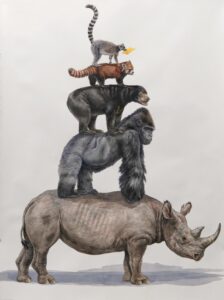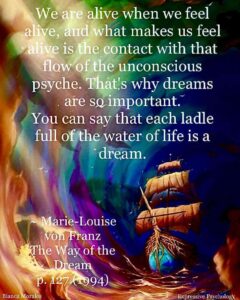“. . . man’s instinctive nature is divided between the instinct for self-preservation and the instinct for species-preservation.” Sigmund Freud “On Narcissism: An Introduction”, in Yearbook of Psycho-Analysis, Vol. 6, 1914, p. 78.
The repression of the unknown parts of ourselves is a third definitive feature of the Epoch II ego. As human consciousness evolved, our thinking became more dualistic and so did our ideas about the gods. About five thousand years ago the solitary Sky Father began to usurp the Great Mother’s authority in the Middle East. Philosopher and Professor Mircea Eliade wrote that this Supreme God was not a daily physical and emotional reality like Goddess, but an intellectual concept. Idealized and aloof, he lived far from us. Over time he grew increasingly uninvolved with human affairs.
As Sky Father gained supremacy, religious experience gave way to theoretic understanding, or philosophy. As Great Mother was repressed, people tended to lose touch with themselves, nature, each other, and the sense of life’s sacredness. For many people today who follow Judaism, Christianity or Islam, God continues to be a separate, superior, human-like, dominant father. He dwells at the top of a hierarchy of males who serve him, he holds the power of life and death over us, and compared to him we are ignorant and powerless.
Insofar as religions continue to elevate and idealize masculinity while disowning its destructive shadow and its complementary feminine partner, today’s religions contribute to individual dysfunctions and the dangerous deterioration of our environment. Fear of incurring the Sky God’s disfavor stifles the biological compulsion to grow and change, to discover and empower our fuller selves. Our fear simply solidifies the Epoch II ego’s position and we retreat from life’s inviting warmth into cold dogma. Vast amounts of our psychological inheritance, the majority of which we associate with Mother, remain buried in a dark, pre-conscious reservoir to which we deny ourselves conscious access.
The same is true of our spiritual inheritance. In the West and Middle East our separating out from the personal mother is accompanied by a rejection of Sacred Mother, but this doesn’t destroy her. In fact, Eliade was convinced that until very recently a sub-stream of Goddess religion still flowed in peasant cultures of the West. Today it is being resurrected in many cultures. Why? Because the Sacred Feminine is an archetypal reality in the human psyche. She is here to stay whether we like it or not.
There is not a firmly entrenched Epoch II ego on the planet that welcomes the reality and power of the disowned feminine or wants to admit that our repression of her is the underlying cause of so much need, conflict, trauma, and tragedy. In the deepest recesses of our psyches a primal war is being waged between two compelling needs: our need to preserve the self-images our egos have so carefully constructed and our need to transcend the limitations our egos have imposed.
The proof of the Epoch II ego’s extreme need to preserve, indeed, to glorify its self-image whatever the cost is its willingness to kill and die for the God it creates in its own image. The Epoch II God is just like us. It is oriented toward masculinity (unlike Jesus’s feminine message of love and acceptance), thinks dualistically, has the same beliefs about good and evil as we do, prefers our particular tribe and dogma, and represses otherness to the point that it is sometimes compelled to destroy the things our tribes fear and despise. With an ego like this worshiping a God like that, is it any wonder most of us find it so incredibly difficult to open to the unknown feminine otherness in our unconscious?
 Scientists have long understood that in the physical world the interaction between polarities is what keeps our planet stable and functioning smoothly. Yet until very recently, few people with Epoch II ego-consciousness have thought of human behavior in the same way.
Scientists have long understood that in the physical world the interaction between polarities is what keeps our planet stable and functioning smoothly. Yet until very recently, few people with Epoch II ego-consciousness have thought of human behavior in the same way.
Jung and Freud’s client Sabina Spielrein broke new ground when she and Viktor Tausk presented this theory to Freud who agreed and wrote the quote at the beginning of this post. We can associate the instinct, or drive, for self-preservation with the “masculine” striving for knowing, competing, and individuating, and the drive for species-preservation with the “feminine” urge toward relating, creating, reproducing, and evolving.
Of course, these urges are not a matter of gender. They are the physical and psychological inheritance of all of us. Epoch III thinkers know this and lose the need for such classifications. But associating phenomena with masculinity and femininity is an age old practice that can be helpful in our Epoch II efforts to understand ourselves and our ideas about God. Developing this dialectical ability is crucial to our psyche’s integration and wholeness and the survival of our species.
Art Images: Self Preservation: Jane Long. The Envelope: Unknown.
This material is taken from Healing the Sacred Divide.
Jean Raffa’s The Bridge to Wholeness and Dream Theatres of the Soul are at Amazon. Healing the Sacred Divide can be found at Amazon and Larson Publications, Inc. Jean’s new Nautilus Award-winning The Soul’s Twins, is at Amazon and Schiffer’s Red Feather Mind, Body, Spirit. Subscribe to her newsletter at www.jeanbenedictraffa.com.






8 Responses
Hi, my dear teacher. Thank you again for this new episode. I would not say it is better than the first one, but as good as that! Especially mentioning the fascinating Sabina Spielrein. However, I just got something in my mind about why we don’t try to imagine the Gods/Goddess without any gender.
As you know, human has been trying to conceive Gods like human themselves, and with the domination of masculinity, they imagine God as a man. We may try to think divinely and take the God genderless: Feminine has no gender, Marion Woodman once said, and I would say: Feminity = Anima = Soul. Always sincerely, Aladin.
I totally agree with you Aladin. The feminine and masculine principles are in all of us, regardless of gender. Neither “feminine” nor “masculine” are about gender. Some think of them as Spirit/Logos and Soul/Eros, as Jung and Marion Woodman did. They are also sometimes associated with the left and right hemispheres of the brain. Essentially, ‘masculine’ and ‘feminine’ are the prototypical pair of opposite drives in us that represent the principle that cooperative interaction between all pairs of opposites generates all creative life. This is the main point of The Soul’s Twins. I suspect you have not been able to find this book where you live. I think you would like it. If you’ll contact me by email we’ll see if we can get you a copy. Sincerely, Jeanie
Dear Jeane, I have got The Soul’s Twins, and if you can remember, I wrote a review on this. It’s a great book indeed, and I have learned a lot from it; as you see in my comment. 😉🥰🙏❤️
Oh, of course, Aladin! How could I forget your wonderful review on Amazon titled “Anatomy of the Soul!” It was very special! Please forgive the senior moment! 🙂
Not a thing! I have such moments often. 🤓Blessing, dear. 💖🙏
Thank you. Blessings to you too.🙏❤️
Pure Love has both feminine and masculine aspects to it.
Absolutely, Richard! This is also a point I’ve made in my newest book, The Soul’s Twins. Love, libido, creativity . . . all life is generated by the interaction between complementary opposites! Thanks for writing. Jeanie